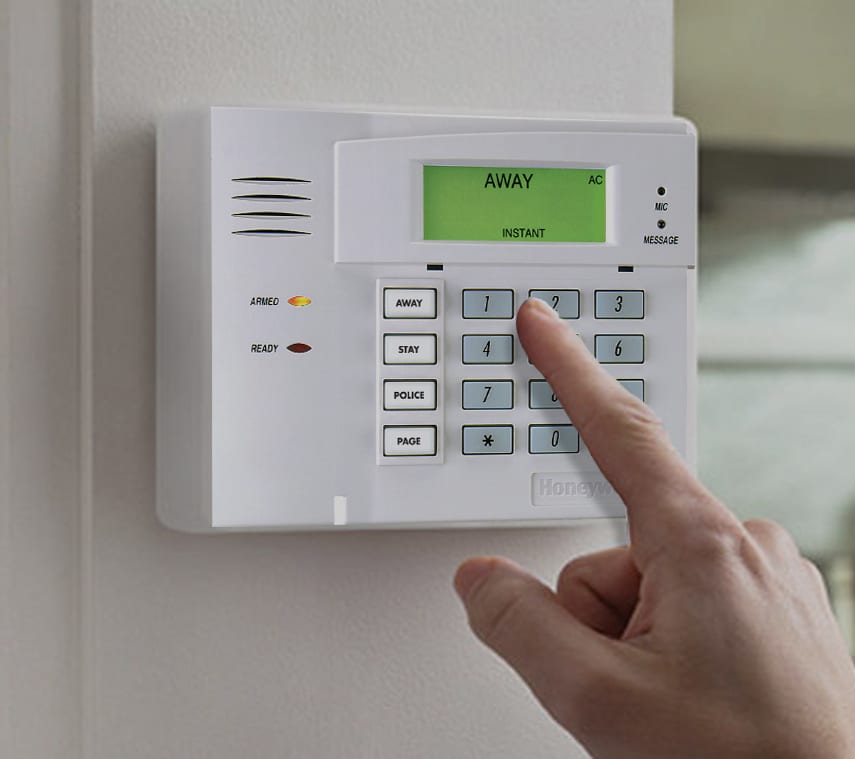With over one million burglary attempts in the United States every year, home security has become a top priority for many homeowners. To protect their properties and loved ones, people often turn to security alarm systems.
However, a crucial decision arises when considering the type of system to install: wireless or wired? Both options come with their own set of advantages and considerations. So, it’s important to weigh the benefits and drawbacks to determine which is better suited for individual needs.
In this article, we’ll compare wireless vs. wired security alarm systems to help you make a more informed decision. We’ll discuss their differences, the pros/cons of each type, as well as installation considerations.
How Do Wired and Wireless Security Alarm Systems Work?
Both wired and wireless security alarm system installations rely on strategically placed sensors throughout the property to detect unauthorized entry. These sensors may be placed at entry points like doors and windows and can be expanded to cover other areas such as the hallways or other high-traffic areas.
The sensors are connected to a central control panel that manages the system’s functionality. When triggered, these sensors send a signal to the control panel, which in turn triggers an alarm. This can be as simple as a loud siren or connected to a monitoring service that will contact authorities in the event of an emergency.
However, the key distinction of security alarm systems lies in how these sensors and control panels communicate.
Wireless Security Alarm Systems
Wireless security alarm systems use radio waves to transmit signals between components. This makes them more flexible and easier to install than wired systems, with no need for wires to run through walls.
Advantages of Wireless Security Alarm Systems
Easy Installation
Wireless systems are much simpler to install, typically taking a fraction of the time. Although it’s still advisable to hire a professional to ensure a correct installation, there’s no need for drilling into walls or running wires through them.
Flexible Placement
Wireless security alarm systems offer greater flexibility when it comes to sensor placement. Since there are no wires to limit their positioning, sensors can be easily moved or repositioned as needed. This flexibility allows homeowners to adapt the system to changing security needs or property layouts without the hassle of rewiring.
Simple Integration with Other Systems
Wireless security alarm systems can easily be integrated with other devices, allowing for greater convenience and control. For example, you can connect your security system with a smart door lock, lights, and even security cameras. This means that you can control multiple devices from one place.
Disadvantages of Wireless Security Alarm Systems
Potential Signal Interference
Wireless security alarm systems rely on radio waves to transmit signals, which can be susceptible to interference. However, modern wireless systems often utilize advanced technology and encryption to minimize these issues.
Possible Battery Issues
Since wireless security alarm systems rely on battery-powered components, there is a risk of batteries running out of power. Therefore, regular battery maintenance is necessary to ensure the system functions optimally.
Wired Security Alarm Systems
As the name suggests, wired security alarm systems rely on physical connections to transmit data between the sensors and the control panel. The network of wires that connects the sensors and panel is typically hidden within the walls or ceilings of the property.
Advantages of Wired Security Alarm Systems
Fewer Components
One of the advantages of wired security alarm systems installation is that they generally have fewer components compared to their wireless counterparts. Since the sensors and control panel are physically connected through wires, there is no need for additional devices such as wireless receivers or transmitters.
Less Likely to Run Out of Power
Another advantage of wired alarm systems is that they are less likely to run out of power, as they do not need battery-powered components like wireless systems. Wired security systems are connected directly to the main power source, so they will continue to operate so long as the power supply remains uninterrupted.
Reliable Connection
Wired security alarm systems offer a reliable and stable connection between the sensors and the control panel. Unlike wireless systems that can be affected by signal interference or disruptions, wired systems transmit data through physical connections, minimizing the risk of communication failures.
Disadvantages of Wired Security Alarm Systems
Installation Complexity
Installing a wired security alarm system requires running wires throughout the property. This process can be labor-intensive, especially if the property lacks pre-installed wiring infrastructure. Hiring a security alarm systems provider is often recommended for wired systems to ensure proper placement and concealment of wires.
May Require Home Repairs After Installation
In some cases, drilling holes in walls for wiring may be necessary. This extra step can result in additional home repair costs and time spent to make sure the system doesn’t look out of place.
Limited Flexibility
Once the wires are installed, changing or expanding the system can be more challenging compared to wireless systems. Adding new sensors or relocating existing ones may require additional wiring, potentially leading to extra costs and inconvenience.
Wrap Up
Both wireless and wired security alarm systems offer unique benefits and considerations. Wireless systems provide convenience, flexibility, easy installation, and seamless integration, making them an attractive choice for many homeowners and businesses. On the other hand, wired systems offer reliability, stability, and a proven track record of providing robust security. Take their respective pros and cons into account when deciding between the two. In the end, what matters is keeping your home or business safe from intruders.
Author Bio: Brian Kozlosky, President/Founder of 2 Krew Security and Surveillance – headquartered in Kittanning, PA. With a Bachelor of Science from Slippery Rock University, I have 15+ years of experience operating a successful security and surveillance company. You can get in touch with me on LinkedIn.




